Woke Language Status Games of Elites - Linguistic Capital Hoarding, Protectionism, and "Academic Mate Suppression"
As someone working in the periphery of academic medicine, I have seen for years the status games of "woke" managerialism first hand.
A little story - I started working in the field of geriatrics about 20 years ago. Obviously, particularly when working with the very old, you end up working around people at high risk of suffering severe and disabling issues with cognitive impairment, often from issues like Alzheimer’s disease or cerebrovascular event (e.g., stroke).
When these cognitive issues are to the point where a person suffers significant issues with so-called instrumental activities of daily living1 that they cannot remediate through compensatory behaviors, these people are said to be suffering from a dementia - which literally is a word that means “without a mind,” (or “the failure of mind which occurs in old age.”)
Fast forward to 2013, and an esteemed group of experts (which, to be fair, they were) got together and proposed an update to the language. No longer were clinicians like me encouraged to speak about “dementia,” we were encouraged to use the term major neurocognitive disorder - which was considered to be more inclusive and less stigmatizing.
Just to skip to the punch line - we all still use the term “dementia.”
“Neurocognitive disorder” is way too wordy, too unwieldy, and none of the patients and families we talk to use the term anyways.
“Inclusive Language” Shifts have been a Common Feature in Medicine, Academia, and Managerialist Bureaucracies for Years
This is a minor example of a phenomenon I think we are all familiar with.
Below is a list of familiar “inclusive language” terms, with their previous, less enlightened linguistic counterparts - the ones the brutish normies use.
First are the ones we tend to see a lot of in popular media, particularly the legacy media:
People of color or minoritized instead of "minority"
Undocumented migrant or undocumented refugee instead of "illegal immigrant"
Native American, First Nation, or indigenous instead of "American Indian"
LatinX instead of “Latino”
Cisgender, non-binary, or gender diverse instead of "man" or "woman"
Then, there’s the so-called “person-centered” language which I have become very familiar with over the years, given its relevance to medical contexts.
Person with substance use disorder instead of "addicted person"
Person with disabilities or differently abled instead of "disabled person"
Person with mental health condition instead of "crazy" or "insane"
Person with autism instead of “autistic person”2
Here’s some other “preferred, inclusive” terms that I see frequently make their way into healthcare:
Houseless or unhoused instead of "homeless.”
Sex worker instead of "prostitute"
Incarcerated person or justice-involved individual instead of "prisoner"
Birthing parent or non-birthing parent instead of "mother" or "father"
The Explosion of “Inclusive Style Guides”
The constantly and exponentially-shifting approved, “inclusive” language generated by academia and the managerial and healthcare-related bureaucracies has created a “gold rush” of ever-expanding style guides to track and document this lexicon - rising from a handful in 2019 to over an estimated 35 as of today.3
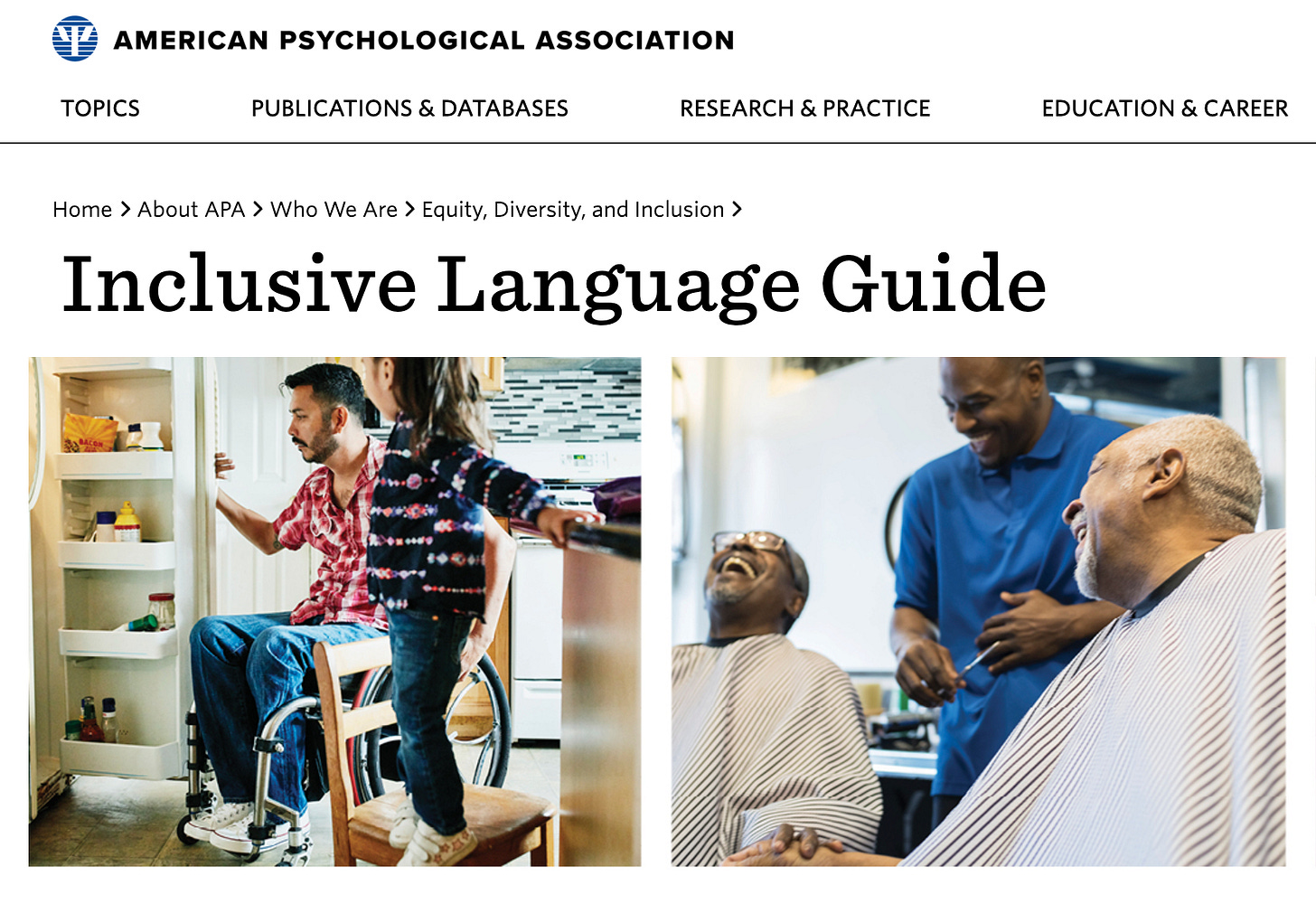
Notable examples:
American Psychological Association (APA) - Publishes one of the most widely cited and influential Inclusive Language Guides, now on its second edition (2025), setting the standard in social and behavioral sciences.
University of California System - Has developed and issued systemwide inclusive language policies affecting all 10 UC campuses, influencing DEI and communication standards across the largest public research university system in the U.S..
Linguistic Society of America (LSA) - As the flagship body for U.S. linguistics, it publishes its own Guidelines for Inclusive Language (2023), influencing research, teaching, and publishing norms.
Even the American Chemical Society (ACS) has gotten into the act - they released their Inclusivity Style Guide in 2021, and have managed to get major chemical and STEM publishing operations to participate.
So What Does Insistence on “Inclusive Language” Actually Do?
Years ago I noticed these “inclusive language” style shifts appearing in primary literature, style guides, training materials, and etc. - & I would at times raise my eyebrows and shrug. Sometimes, these language shifts seemed silly and self-indulgent, but largely harmless (which is how I treated progressivism up until fairly recently).
If the language shifts weren’t too unwieldy, I would use them. For example, I started using “Native American” instead of “American Indian” a number of years ago. I mean, why not? After all, it sounded more respectful and enlightened - and hey, sure, my ancestors settled in North America 400+ years ago, but those people were here first, so, right, “Native Americans” works, right?
Interestingly, I have found out since - there is there is often a very clear preference for the term “American Indian” over the supposedly more “inclusive” terms like “First Nations” or “Indigenous” - amongst the very people these new “inclusive” terms were supposed to describe.
There are other more extreme and absurd examples. For example there was that recent push, completely from amongst academics and “Emily’s List” progressive activists - to encourage the use of the term “LatinX” as opposed to “Latino” - the thinking being that referring to an entire group of people using “gendered language” was not “inclusive.”
The term was so soundly rejected by the Latino community as being obviously a product of elite academic circles with no connection to the community they were imposing it upon that it landed with an almost resounding thud. I mean, it was really, really bad.
So - let’s leave aside the idea of the stated good intentions of progressive academics - to be “inclusive” and “equitable,” and “anti-racist” or what have you (because they love talking about that, and that gets old). Lets ask ourselves - what is really happening here, why are these language games so increasingly popular?
They function as a form of “linguistic capital hoarding.”4
This term describes the process by which elite groups or institutions accumulate and guard their exclusive forms of speech. This isn’t just something that academia does - professional guilds are notorious for this (I am old enough to recall that medical and law schools used to train their practitioners in Latin). Psychologists are notorious for “psychobabble” - a special form of mental health jargon. The entire field of DEI is soaked in this stuff - special language, language that constantly shifts, a moving target. Exclusive groups have exclusive language. This is how you mark your group as special and distinct from everyone else.
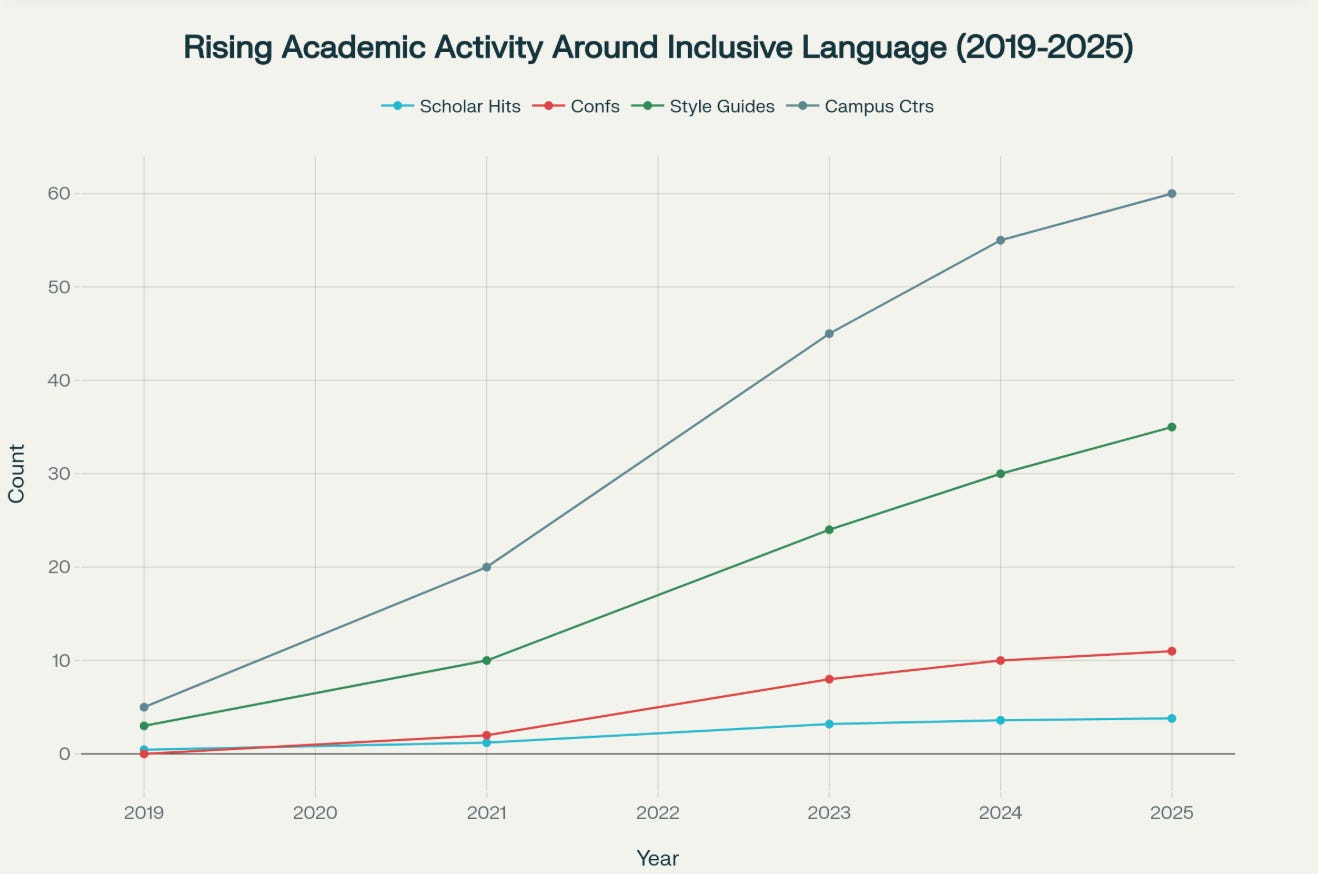
A related sociology term I heard was that this “woke language” stuff, particularly in terms of it’s moving-target quality, is a form of embodied capital - with it’s value dependent on scarcity: once the broader public adopts a term, tastemakers retire it and mint a new one, preserving differential power, prestige, and professional gatekeeping within the group - ironically, the exact opposite of “inclusive language.”5
The constant language games terms obscure the process of discovering truth and solving social problems.
An example that came to mind for me was that of the new term “houselessness” to replace what I’ve always called “homelessness.”
Yes, it’s considered “inclusive” to refer to people as “houseless” now, and you must retire the older term (the idea is that referring to a person as "houseless" removes “stigma” by suggesting the person has shelter, just not a traditional house).
Obviously, this is f***ing bananas - I’m confident in saying there is exactly zero research that demonstrates that using the term "houseless" over “homeless” leads in any way to improved outcomes for people experiencing homelessness. When it to reducing homelessness, people need homes that are affordable, they need good paying jobs, and a good social safety net - in other words, material conditions are what matter.
But it gets worse. These language games get so ridiculous that they obviously risk obscuring the necessary process of arriving at appropriate solutions as a society. Because of this constantly-shifting and often increasingly vague language, the words gets opaque and obscure (frequently just for the purposes of “avoiding stigma” - theoretically making someone feel unhappy). Language becomes imprecise, people get confused.
Take again the case of “houseless” versus “homeless.” OK, so someone who is perpetually couch-surfing, living in an RV, and maybe occasionally bunking at a shelter, they may be “houseless” but hey - they have shelter, right? So maybe, to policymakers and the public, it’s less urgent (whereas in the Before Times, where we all agreed that this is homelessness - the issues remained clear).
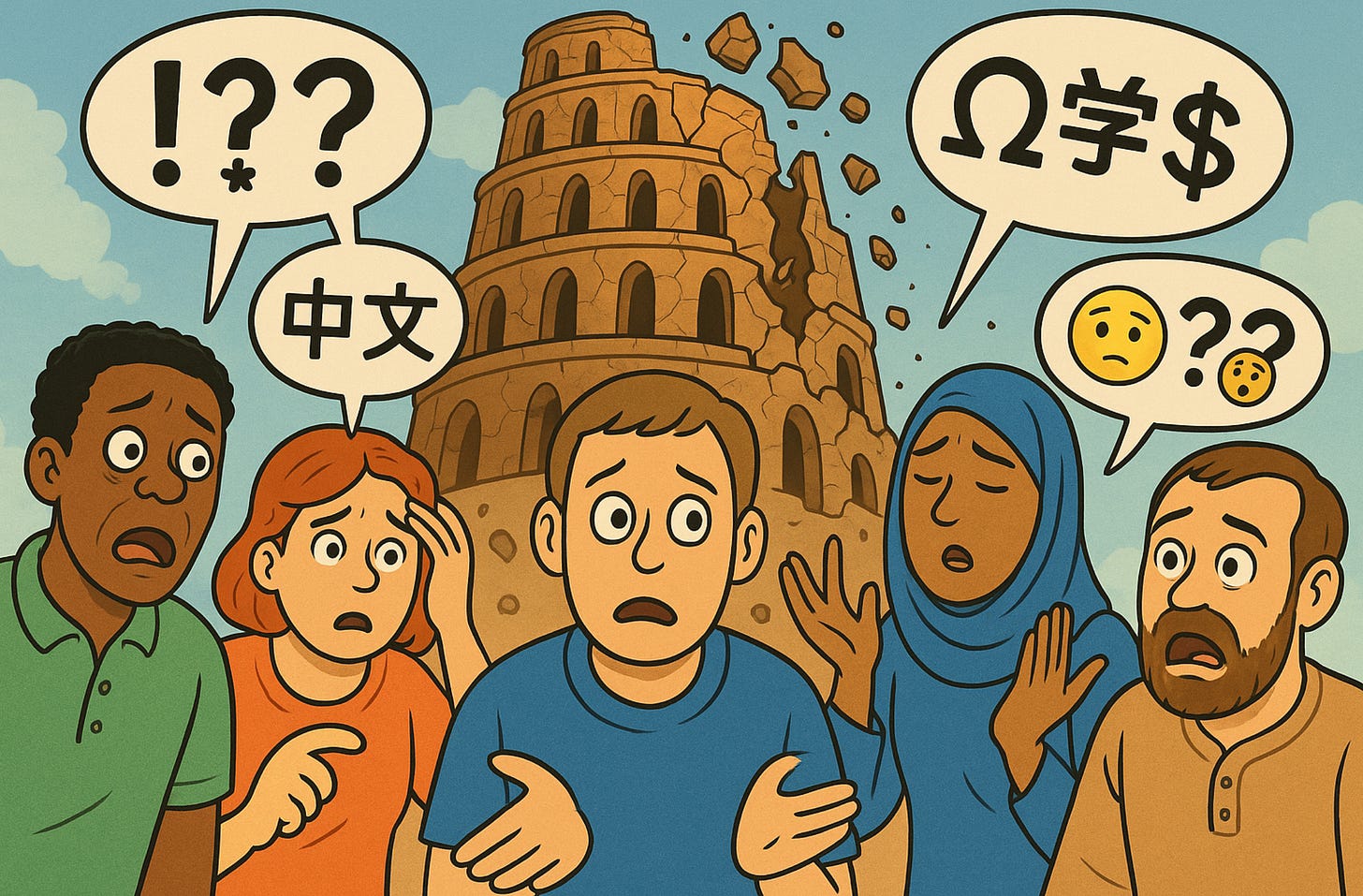
There’s a philosopher named Robert Morgan who coined a term - “hermeneutical disarmament.”
Think of his concept as describing these “inclusive” language games of elite academics, managerialists, and media types as basically akin to the biblical, book-of-Genesis level “Tower of Babel.” This ever-consuming obsession (supercharged by the DEI craze) with building a perfect “inclusive language” that they master and control, instead inserts terminally euphemistic, confusing, and fuzzy language that terminally impairs our ability to clearly diagnose and solve social problems.
But that’s the point. These language games are not about creating a better world. They are about hoarding social (linguistic) capital - one where they sit at the top of the hierarchy and reap the rewards.
If problems are obscured and not solved - that’s someone else’s problem.
The “Linguistic Justice" Movement
Just for the final cherry on the top, I wanted to introduce you to something that I learned about due to some proximity I have to academia - something called the “linguistic justice” movement.
You’ll notice I write in a relatively conversational form of what you’d probably call “standard English.” This is how I learned to write from a young age, a skill of mine that I honed with what was, at the time, pretty quality undergraduate training, and turned me into what I am today.
But - you see - there are people in the world who do not speak and write in standard English, and instead communicate in vernacular, or dialects, such as, famously, what is commonly known as “African American Vernacular English” (AAVE) - or what was, up until recently, called “ebonics.”
Standard English - or what I’ve heard called the “Kings English” (e.g., the linguistic benchmark that exemplifies correct grammar, pronunciation, etc.) has, because of the previous influence of the British imperial remnant, become the default “language of commerce,” and the language of scientific communication, for good or ill for the world.
In about the 1970s, a niche civil rights political advocacy movement called “linguistic justice” was started - which basically said that insistence on the “Kings English” as the academic standard was to be challenged as inherently racist and yes - white supremacist.
This movement (which, oddly, seems to largely ignore the prevalence of nonstandard English dialects amongst whites who live in the South, or Appalachia, or in the poorer towns of the UK, etc.) hung around for several decades in the periphery of academia, and then like many niche, ideological movements on the left, became supercharged by the 2020 BLM riots and the racialized “color revolution.”
Without going into too much detail - the idea is that instructors and practitioners of “linguistic justice” are, instead of being encouraged to insist on standard english, to allow their students to communicate in their own, “authentic” languages.
If that involves a lot of use of the double negatives, slang, and vernacular that’s common to “black English” well, that’s OK because insisting on some actual standard way that everyone is supposed to communicate, well, that’s white supremacy - bordering on Hitlerian! Right?
The “Linguistic Justice” Fad as a form of Academic Mate Suppression
The idea of “linguistic justice” in academia - the idea that students should be encouraged to speak in at times incomprehensible slang or vernacular - is in my opinion completely insidious and absurd.
So on the one side, we have the ever-increasing creep of woke “inclusive language” that has gotten to the point where progressively-metastasizing “style guides” need to be endlessly published and updated in order for the properly anointed to keep up.
Yet - at the same time these same academics are encouraging their students to reject the learning of Standard English and instead to write in potentially incomprehensible English slang and vernacular.
To me - this looks like the act of a protection racket, protecting and hoarding their linguistic capital, while at the same time hobbling new entrants with what basically amount to academic mate suppression tactics.
“Mate suppression” is a phenomenon long observed in biology - for example, in acorn woodpeckers, where multiple females nest cooperatively, dominant females are known to destroy the eggs of subordinate females before laying their own. This behavior suppresses the reproduction of other females so that only the dominant female’s eggs survive and are raised by the group.
You see the behavior in humans as well - for example, women who cannily lie to their friends (and potential competitors to their romantic prospects) that no, in fact, you are actually quite attractive with your multiple nose rings, and actually a BMI of 45 is attractive, and yes, you should cut your hair short, that’s beautiful!
“Linguistic justice” feels great for the instructors. They get to feel like social justice heroes.
But are any of the these students (qua victims) of “linguistic justice practices,” those from “marginalized” backgrounds - whether they are black from the inner cities or ‘poor white trash’ from a forgotten corner of Appalachia - end up as actual competition for these academics?
Or truly as contenders in commerce, entrepreneurship, or the byzantine managerialist bureaucracy (short of being just mascots)? No - they will not be threats or competition, and that’s the point.
So Remember
The next time you see academics solemnly invoking the latest “inclusive” term or drops yet another labyrinthine style guide in your inbox, remember: this isn’t about progress, it’s about crass protectionism - protecting class capital.
Academia isn’t just an unaccountable business—it’s a special kind of business, a prestige factory, expertly designed for those who play its shifting language games while dazzling newcomers with the promise of “social justice” that, when you scrutinize how it all works, you can see clearly they have zero chance of actually delivering.
Make zero mistake - underneath the hand-wringing about “equity” and “inclusiveness” lies an ancient impulse: hoard the capital, keep the club small, and preserve your place at the top—even if it means leaving everyone else talking in circles at the foot of the Tower of Babel while Rome burns.
think things like balancing ones checkbook, or engaging in housecleaning, or remembering to take pills, etc.
Interestingly, in doing research for this article, it appears that autism sufferers overwhelming prefer so-called “identity first” language - in other words, nearly 90% of them, when asked, prefer to be called “autistics” rather than “people with autism.” It is the healthcare practitioners themselves, revealingly, that seem preoccupied with “woke language”: https://journals.sagepub.com/doi/10.1177/13623613221130845
there is no central database of these “inclusive language” / DEI-type approved language guides, but this is the estimate I could get Perplexity to cough up for me
The term draws from the ideas of a French sociologist by the name of Pierre Bourdieu
Examples - “Handicapped,” now replaced by “disabled” or “person with disabilities.” “Colored people,” standard in mid-20th-century civil rights groups, gave way to “Black,” then “African American,” then “people of color.” “Homosexual” served as a technical and inclusive term before “gay,” “lesbian,” “queer,” or “LGBTQ+.” “Elderly” was widely used to convey respect compared to “old people,” but is now often replaced by “older adults” or “seniors.”

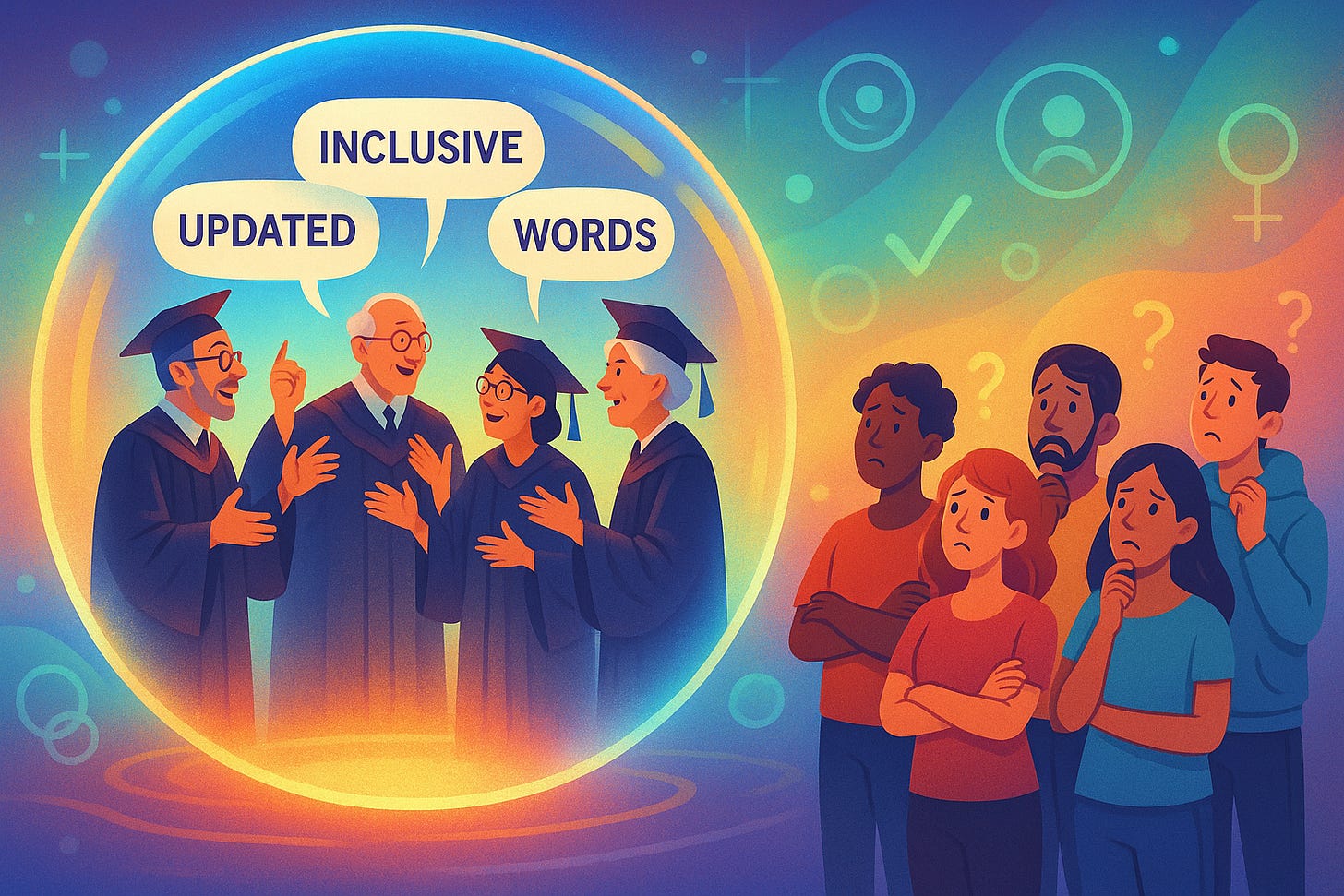


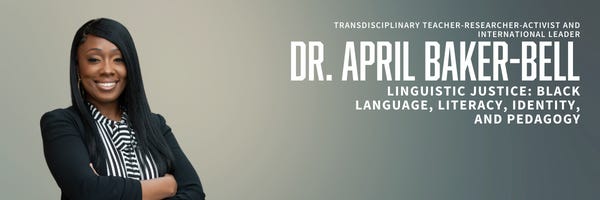
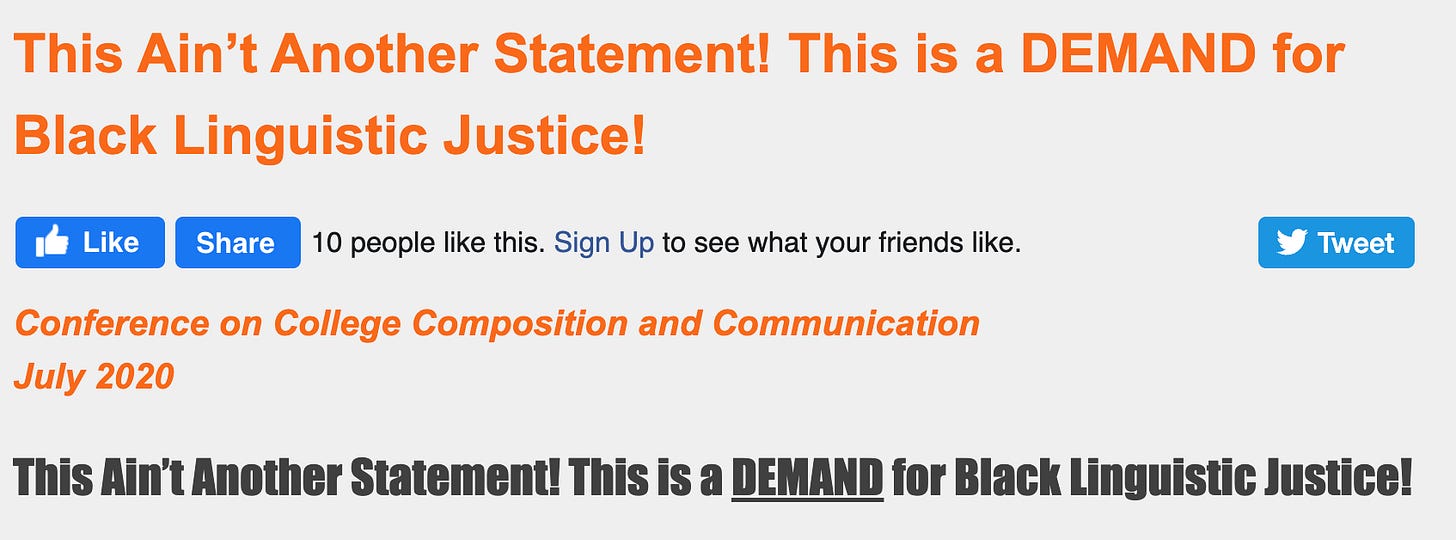
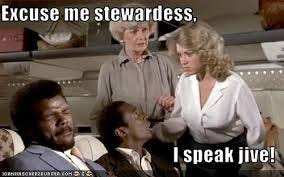

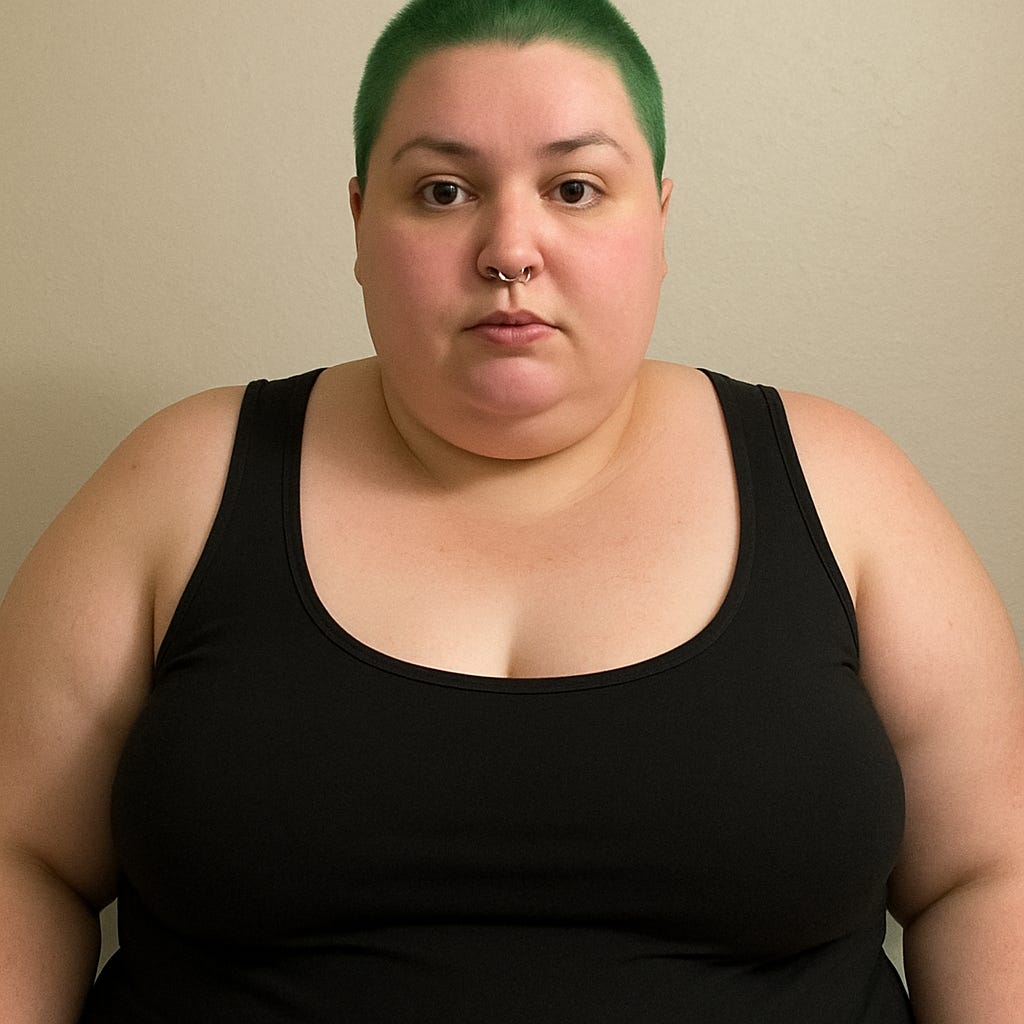
GeroDoc…… I always appreciate and enjoy reading what you write…… your posts on X and your articles in Substack. You always have interesting and relevant things to say, which I think about. And, I really like your writing style. - Marcy
Brilliant analysis, and a useful explainer for those who may be confused by, or unwittingly sucked into this labyrinth of linguistic lunacy.